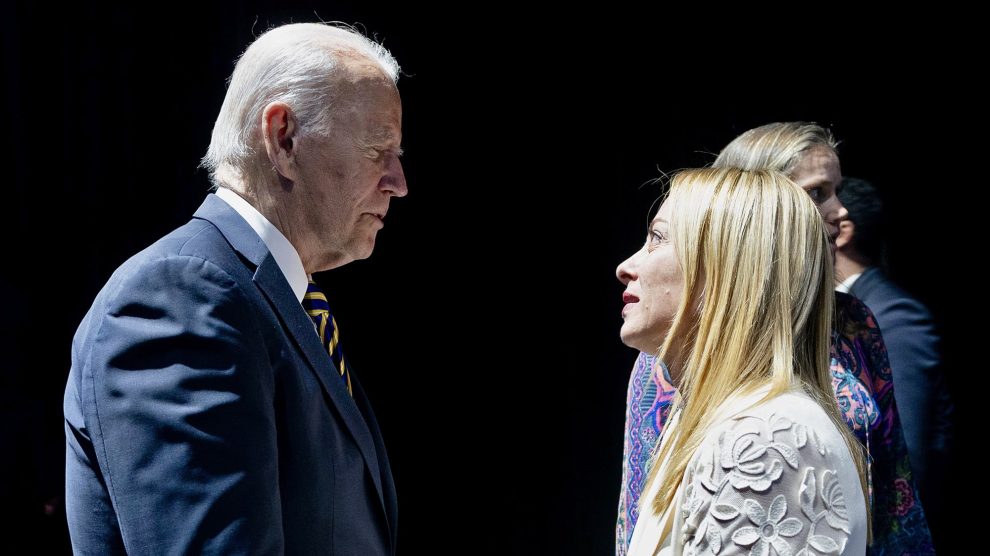The Biden-Meloni meeting is coming up. The Italian Prime Minister is expected in the White House this coming Thursday, July 27. Her talks with United States President Joe Biden will surely include China, their respective relations with it and what to expect of the great power competition going forward. However, it’s unclear if the two will discuss Italy’s membership in China’s Belt and Road Initiative.
- Speaking to reporters after the Development and Migration Conference, PM Meloni underscored that clarifications on Rome’s intentions had “never been asked of me.”
A step back. The Memorandum of Understanding tying Rome to the BRI is set to auto-renew in early 2024 unless one of the parties explicitly states its intention to back out. The Italian executive is leaning towards the latter option, as PM Meloni reportedly told US House Speaker Kevin McCarthy when he and other MPs visited Rome in May. Later, Congressman Jimmy Panetta said (while speaking at the Italian-American Caucus) they realised it’s not a matter of if, but how.
- The matter is politically delicate, as the Italian executive fears (not without reason) a degree of economic backlash on behalf of Beijing and intends to minimise it.
- President Biden might ask the Italian PM what her intentions are, but it’s highly unlikely for an official decision to come out of the Oval Office.
Beijing goes on the offensive. Again, the ever-watching Chinese propaganda apparatus did not fail to raise the pressure with a hot take. In response to Italian anticipations picked up by the international press, the Global Times published an editorial warning that “the uncertainty doesn’t mean it is acceptable or appropriate for the BRI deal, which is only between China and Italy, to become a topic of discussion between Italy and the US.”
- On Tuesday, Chinese Foreign Ministry spokesman Mao Ning said at the regular daily briefing that it is “in the interest of both sides to further exploit the potential of our cooperation.”
- Earlier pieces criticised the “US-led anti-China atmosphere” and suggested that Washington, driven by political motives, was bad-mouthing the BRI by distorting its goals and exerting its sway on other Western countries to create friction.
You better like it, or else… The Global Times piece goes on to issue the same threat dangled by China’s diplomatic envoys (starting with the Ambassador to Italy Jia Guide): “If Italy decides to withdraw from a platform that demonstrated mutual political trust and improved the strategic level of cooperation between the two countries, there is every reason to be concerned about the potential negative impact.”
- Meanwhile, knowing full well that the economic benefits China promised Italy through the BRI failed to materialise – and thus, as PM Meloni remarked, “one can have good relations, even in important areas, with Beijing without these necessarily being part of an overall strategic plan” –, Chinese envoys have embarked on a business charm offensive.
Damage control. It’s no coincidence that Italian diplomacy is working on a meeting between PM Meloni and President Xi Jinping (who had invited her to Beijing at the G-20 summit in Bali, Indonesia, in November 2022) to unravel the matter. It’s more likely for them to meet in neutral territory – such as September’s G-20 leaders’ summit in New Delhi, India – than Ms Meloni to travel to China.
- Chinese diplomacy might propose the BRI forum, planned for later this year to mark the project’s 10-year anniversary, as a suitable framework. But such a stage could only cause embarrassment for Italy, especially if it ends up dropping out of the deal.
- Participating to then exit the BRI would be perceived as rude – only slightly better than participating, remaining ambiguous about the deal, and then dropping out.
- Two more missions from Rome could reach Beijing in the coming weeks: a diplomatic one, and another featuring Antonio Tajani, Foreign Minister and deputy PM.




